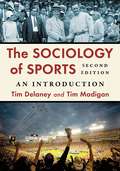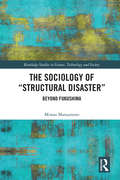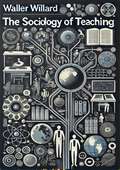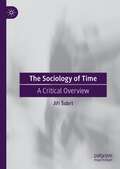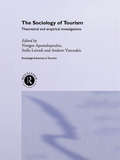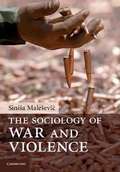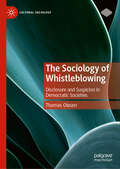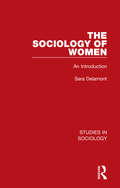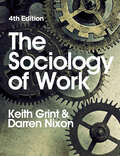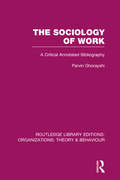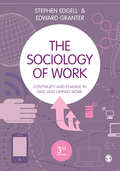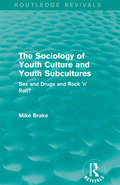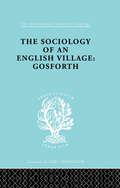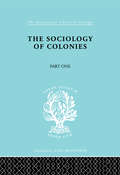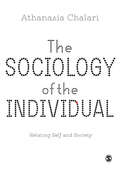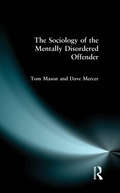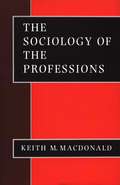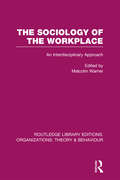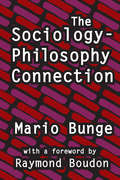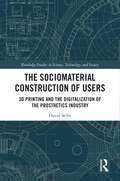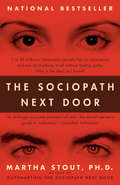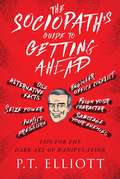- Table View
- List View
The Sociology of Sports: An Introduction
by Tim Delaney Tim MadiganIn its second edition, this book takes a fresh approach to the study of sports, presenting key concepts such as socialization, economics, gender, race, ethnicity, religion, politics, the media and the role of sports in society. The authors offer a critical examination but highlight also the many positive aspects of sports. Each chapter concludes with a popular culture section, showing how films, television, video games, music and short stories have contributed to our understanding of sports' significance to our lives. <p><p>Other features include up-to-date information--such as statistics on player and owner salaries--and a look at recent controversies in sports, such as performance-enhancing drugs, domestic violence, online gambling and the growing concern over concussions and post-career health problems. The value of sports for people with physical disabilities and special needs is discussed, as well as the development of sports studies programs and the continuing importance of "sportsmanship." The final chapter explores how social media, as well as new forms of virtual reality and the prevalence of video gaming, are reshaping the concept of what constitutes a sport.
The Sociology of Structural Disaster: Beyond Fukushima (Routledge Studies in Science, Technology and Society)
by Miwao MatsumotoHow and why did credible scientists, engineers, government officials, journalists, and others collectively give rise to a drastic failure to control the threat to the population of the Fukushima disaster? Why was there no effort on the part of inter-organizational networks, well-coordinated in the nuclear village, to prevent the risks from turning into a disaster? This book answers these questions by formulating the concept of "structural disaster" afresh. First, the book presents the path-dependent development of structural disaster through a sociological reformulation of path-dependent mechanisms not only in the context of nuclear energy but also in the context of renewable energy. Secondly, it traces the origins of structural disaster to a secret accident involving standardized military technology immediately before World War II, and opportunistic utilization of the Great Kanto Earthquake of 1923, thus reconstructing the development of structural disaster within a long-term historical perspective. Maintaining distance from conflicts of interest and cultural essentialisms, this book highlights configurations and mechanisms of structural disasters that are far more persistent, more universal, but less visible, and that have turned risk into suffering. The book seeks to cast light on an important new horizon of the science-technology-society interface in the sociology of science and technology, science and technology studies, the sociology of disaster, the social history of the military-industrial-university complex, and beyond.
The Sociology of Teaching
by Waller Willard"The Sociology of Teaching" by Waller Willard is a groundbreaking exploration of the complex social dynamics that shape the educational environment. Willard, a pioneering sociologist, provides a comprehensive analysis of the interactions between teachers, students, and the institutional structures within which they operate. This seminal work delves into the sociological aspects of teaching, offering profound insights into the roles, relationships, and cultural norms that influence the educational process.Willard's detailed examination covers various dimensions of the teaching profession, including the authority and social status of teachers, the impact of organizational culture on educational practices, and the intricate socialization processes that occur within schools. He explores the ways in which teachers' identities and behaviors are shaped by their social contexts, as well as the expectations and pressures imposed by society and educational institutions.One of the key contributions of "The Sociology of Teaching" is its analysis of the teacher-student relationship. Willard investigates how power dynamics, communication patterns, and social expectations influence interactions in the classroom. He highlights the reciprocal nature of this relationship, showing how both teachers and students affect and are affected by each other's behaviors and attitudes.Willard also addresses the broader societal implications of education, discussing how schools serve as agents of socialization, transmit cultural values, and contribute to social stratification. His work underscores the importance of understanding the social context of teaching to develop more effective educational policies and practices."The Sociology of Teaching" is an essential read for educators, sociologists, and policymakers interested in the intersection of education and society. Willard's rigorous research and insightful analysis provide a valuable framework for examining the social dimensions of teaching, making this book a timeless resource for those seeking to understand and improve the educational system.
The Sociology of Terrorism: People, Places and Processes
by Stephen VertigansThis is the first terrorism textbook based on sociological research. It adopts an innovative framework that draws together historical and modern, local and global, and social processes for a range of individuals, groups and societies. Individual behaviour and dispositions are embedded within these broader relationships and activities, allowing a more holistic account of terrorism to emerge. In addition, the shifting forms of identification and interwoven attitudes to political violence are discussed in order to explain the emergence, continuation, and end of ‘terrorist’ careers. The book draws on examples from across the discursive spectrum, including religious, ‘red’ and ‘black’ racialist, nationalist, and trans-national. It also spans territories as diverse as Chechnya, Germany, Italy, Japan, Northern Ireland, Pakistan, Palestine, Saudi Arabia, South America, the UK, and the US.
The Sociology of Time: A Critical Overview
by Jiří ŠubrtIn a critical, comparative study of the sociological literature, this book explores the term “time,” and the various interconnections between time and a broad cluster of topics that create a conceptual labyrinth. Various understandings of time manifest themselves in the context of many individual social problems—there is no single vision in sociology of how to grasp time and address within social theory. This book, therefore, attempts to define an approach to the concept of time and its associated terms (duration, temporality, acceleration, compression, temporal structures, change, historical consciousness, and others). The volume is guided by a critical engagement with three main questions: a) the formation of human understanding of time; b) the functioning of temporal structures at different levels of social reality; c) the role and place of time in general sociological theory.
The Sociology of Tourism: Theoretical and Empirical Investigations (Routledge Advances in Tourism #Vol. 1)
by Yiorgos Apostolopoulos Stella Leivadi Andrew YiannakisThe rapid expansion of the tourism industry has provided many economic benefits and affected every facet of contemporary societies including employment, government revenue and cultural manifestations. However, tourism can also be considered a problematic phenomenon, promoting dependency, underdevelopment and adverse sociocultural effects, especially for developing countries. This pioneering work provides a comprehensive review of these complex tourism issues from a sociological perspective. Various theoretical and empirical approaches are introduced and the following issues are discussed: * identifiable and stable forms of touristic behaviour and roles* social divisions within tourism* the interdependence of tourism and social institutions* the effects of transnational tourism and commodification on the ecosystem.Featuring international contributions from nine different countries, this book brings together the most noted theoretical and empirical studies and enriches them with diverse experiences and perspectives.
The Sociology of War and Violence
by Sinisa MalesevicWar is a highly complex and dynamic form of social conflict. This new book demonstrates the importance of using sociological tools to understand the changing character of war and organised violence. The author offers an original analysis of the historical and contemporary impact that coercion and warfare have on the transformation of social life, and vice versa. Although war and violence were decisive components in the formation of modernity most analyses tend to shy away from the sociological study of the gory origins of contemporary social life. In contrast, this book brings the study of organised violence to the fore by providing a wide-ranging sociological analysis that links classical and contemporary theories with specific historical and geographical contexts. Topics covered include violence before modernity, warfare in the modern age, nationalism and war, war propaganda, battlefield solidarity, war and social stratification, gender and organised violence, and the new wars debate.
The Sociology of Whistleblowing: Disclosure and Suspicion in Democratic Societies (Cultural Sociology)
by Thomas OlesenThis book views the whistleblower as a key character in democratic societies. It argues that whistleblowing is likely to become an increasingly important form of action in the coming years. Whistleblowers are unique actors in our democracies because they disclose wrongdoing from the inside, as organization employees. With their privileged access and specialized knowledge, they contribute powerfully to public, democratic, and moral debates in a way that no one else can. The book explores whistleblowers&’ relation to democracy by connecting them to values such as suspicion, openness, honesty, and critique. While anchored in a cultural sociological tradition, the book draws on several different sociological thinkers such as Niklas Luhmann, Ulrich Beck, Anthony Giddens, Jürgen Habermas, and Pierre Bourdieu. Themes in the book include the democratic history of the whistleblower, normalized wrongdoing in organizations, the place of whistleblowers in popular culture, and Big Tech whistleblowing. This book will be of interest to readers in fields including political sociology, public sociology, the sociology of work, and organization studies.
The Sociology of Women: An Introduction (Studies in Sociology)
by Sara DelamontOriginally published in 1980 The Sociology of Women: An Introduction aimed to provide a sociological, biographically organised portrait of women written from a feminist perspective. It was the first self-contained analytical textbook treatment to present an account of the situation of women in modern Britain that was informed by sociological research. At the same time, it remained a straightforward and elementary text in the sense that it assumed no previous knowledge and is written throughout with the beginning student in mind; it provided a lively, thorough and realistic introduction to a range of sociological issues and problems; it is abundantly illustrated by examples from research findings and views women always in the context of the wider society around them; nor does it shirk controversial questions. The book opens with a short chapter on sex and gender, then traces women’s lives as they grow from childhood through to old age. There are chapters on childhood, adolescence and early adulthood in the first part of the book, which deals principally with the home, the school and friendship patterns. In part two the focus shifts to the adult lives of women. The chapters here are on work, illness and deviance; on class and community; on politics, leisure and religion; and on motherhood and old age. An important feature of the book will be the extensive guidance it provides on further reading and the inclusion of a full bibliography of material on women’s lives.
The Sociology of Work
by Keith Grint Darren NixonThe Sociology of Work, 4th Edition This leading, authoritative textbook has been carefully and substantially revised to provide the indispensable foundational resource for the sociology of work. The fourth edition has been transformed to combine unrivalled explanations of classic theories with the most cutting-edge research, data and debates. Keith Grint and Darren Nixon examine different sociological approaches to work, emphasizing the links between social processes, institutions of employment and their social and domestic contexts. The fourth edition includes: a new chapter on work and identity, exploring issues such as the rise of consumption and the cultural economy, work–life balance, the social meaning of work and unemployment; a fully rewritten chapter that comprehensively reviews trends in the contemporary service economy, particularly the rise of emotional and aesthetic forms of labour and the polarization of employment in the knowledge or informational economy; a new concluding chapter that examines the structure of the global economy, taking in debates around globalization, precarious labour and public sector reforms and unemployment in the wake of the financial crisis and austerity; updated bibliographic references and data throughout, with particularly significant revisions to the sections on gender and work, ethnicity and work, and work technologies. The book has been designed to support readers' understanding of, and to develop their critical approach to, the field of 'work', with a range of empirical evidence and examples helping to reveal the complex picture of work–society relations. Written in a lively and accessible style, the book also provides suggestions for further reading and seminar discussion questions. This fourth edition will continue to be essential reading for students of the sociology of work, industrial sociology, organizational behaviour and industrial relations. Students studying business and management courses with a sociological component will also find the book invaluable.
The Sociology of Work: A Critical Annotated Bibliography (Routledge Library Editions: Organizations)
by Parvin GhorayshiThis reference volume reflects the changing world of work. It includes research on the various dimensions of work, such as the structure of the labour force, labour market segmentation, technology, employment/unemployment, trade unions, and industrial democracy. This book provides an integrated view of the various dimensions of work, its distinguishing characteristics and issues both peculiar, as well as common to industrialized countries. By adopting an interdisciplinary and interactional perspective, this volume provides the scholar and the lay reader with a range of approaches and debates that have made a significant contribution toward understanding the changing nature of work and its social impact.
The Sociology of Work: Continuity and Change in Paid and Unpaid Work
by Professor Stephen Edgell Dr. Edward Granter&‘Definitive, critical and engaging, this is a superb introduction to the sociology of work.&’ Leo McCann, Professor of Management, University of York Now in a fully updated third edition, The Sociology of Work draws on the work of classic and contemporary theorists, to provide readers with a thorough exploration of all aspects of work and employment, including paid and unpaid work, standard and non-standard employment, and unemployment. The new edition includes: Two new chapters on &“Work, Skill and the Labour Process&” and &“Managing Culture at Work&”. Expanded coverage of the rise and decline of trade unions; emotional labour, misbehaviour, and resistance at work. Further discussion of the gig economy and precarious work; automation and the end of work; globalization and human rights. For Sociology and Business students, taking modules in work, employment and society.
The Sociology of Work: Continuity and Change in Paid and Unpaid Work
by Professor Stephen Edgell Dr. Edward Granter&‘Definitive, critical and engaging, this is a superb introduction to the sociology of work.&’ Leo McCann, Professor of Management, University of York Now in a fully updated third edition, The Sociology of Work draws on the work of classic and contemporary theorists, to provide readers with a thorough exploration of all aspects of work and employment, including paid and unpaid work, standard and non-standard employment, and unemployment. The new edition includes: Two new chapters on &“Work, Skill and the Labour Process&” and &“Managing Culture at Work&”. Expanded coverage of the rise and decline of trade unions; emotional labour, misbehaviour, and resistance at work. Further discussion of the gig economy and precarious work; automation and the end of work; globalization and human rights. For Sociology and Business students, taking modules in work, employment and society.
The Sociology of Youth Culture and Youth Subcultures: Sex and Drugs and Rock 'n' Roll? (Routledge Revivals)
by Michael BrakeFirst published in 1980, this book argues that subcultures are formed in defence of collectively experienced problems that arise from defects and contradictions in social structures. Mike Brake looks at the development of post-war youth culture in a sociological context and considers the class base of youth subcultures, showing that they generate a form of collective identity from which an individual identity can be achieved, outside that ascribed by class, education or occupation. Black youth and young females are two groups given special attention here since Brake notes they are prone to particular problems resulting from the racism and sexism inherent in much youth culture.
The Sociology of an English Village: Gosforth (International Library of Sociology)
by W. M. WilliamsFirst Published in 1998. Routledge is an imprint of Taylor & Francis, an informa company.
The Sociology of the Colonies [Part 1]: An Introduction to the Study of Race Contact (International Library of Sociology)
by Rene MaunierFirst published in 1998. Routledge is an imprint of Taylor & Francis, an informa company.
The Sociology of the Individual: Relating Self and Society
by Athanasia ChalariWhat it socialization? What is interaction? What do we mean by identity? How can we explain the notion of self? What do we mean by intra-action? The Sociology of the Individual is an innovative and though-provoking sociological exploration of how the ideas of the individual and society relate. Expertly combining conceptual depth with clarity of style, Athanasia Chalari: explains the key sociological and psychological theories related to the investigation of the social and the personal analyses the ways that both sociology and psychology can contribute to a more complete understanding and theorising of everyday life uses a mix of international cases and everyday examples to encourage critical reflection. The Sociology of the Individual is an essential read for upper level undergraduates or postgraduates looking for a deeper and more sophisticated understanding of the connection between the social world and the inner life of the individual. Perfect for modules exploring the sociology of the self, self and society, and self and identity.
The Sociology of the Individual: Relating Self and Society
by Athanasia ChalariWhat it socialization? What is interaction? What do we mean by identity? How can we explain the notion of self? What do we mean by intra-action? The Sociology of the Individual is an innovative and though-provoking sociological exploration of how the ideas of the individual and society relate. Expertly combining conceptual depth with clarity of style, Athanasia Chalari: explains the key sociological and psychological theories related to the investigation of the social and the personal analyses the ways that both sociology and psychology can contribute to a more complete understanding and theorising of everyday life uses a mix of international cases and everyday examples to encourage critical reflection. The Sociology of the Individual is an essential read for upper level undergraduates or postgraduates looking for a deeper and more sophisticated understanding of the connection between the social world and the inner life of the individual. Perfect for modules exploring the sociology of the self, self and society, and self and identity.
The Sociology of the Mentally Disordered Offender
by Tom Mason Dave MercerIn recent years mentally disordered offenders have attracted considerable attention in the media and there has been heated public debate as to the best treatment and prevention of re-offending. Simultaneously there has been a significant increase in the amount of research, specialist courses and training devoted to this particular, high profile area of mental health care. This is as a result of considerable public pressure to develop effective theory and practice for diagnosing and treating this patient group.A Sociology of the Mentally Disordered Offender provides a concise, and most importantly, accessible guide to the main theoretical issues from a sociological perspective as a counterbalance to the predominant medical model. Having established a theoretical framework through the exploration of topics such as the relationship between crime and mental disorder the authors look at the processes by which offenders are referred either to criminal justice or the mental health service system, their subsequent treatment and management, and the problem of re-offending. A final chapter looks at ways in which care and management of these patients may be effectively developed in the future.
The Sociology of the Professions: SAGE Publications
by Professor Keith M MacdonaldThis much-needed book provides a systematic introduction, both conceptual and applied, to the sociology of the professions. Keith Macdonald guides the reader through the chief sociological approaches to the professions, addressing their strengths and weaknesses. The discussion is richly illustrated by examples from and comparisons between the professions in Britain, the United States and Europe, relating their development to their cultural context. The social exclusivity that professions aim for is discussed in relation to social stratification, patriarchy and knowledge, and is thoroughly illustrated by reference to examples from medicine and other established professions, such as law and architecture. The themes of the book are drawn together in a final chapter by means of a case study of accountancy.
The Sociology of the Workplace: Organizations: Sociology Of The Workplace: An Interdisciplinary Approach (Routledge Library Editions: Organizations)
by Malcolm WarnerThis volume adopts an interdisciplinary approach. The study of the workplace is approached from the standpoint of industrial sociology, industrial relations, industrial anthropology and other related disciplines. It includes contributions from economists and psychologists as well as from sociologists. The theoretical and practical issues raised, are, however, central to the sociological tradition of Marx and Weber in that they concern the meaning of human and social phenomena and their relevance to resolving questions of moment in industrial and industrializing societies.
The Sociology-philosophy Connection
by Mario BungeMost social scientists and philosophers claim that sociology and philosophy are disjoint fields of inquiry. Some have wondered how to trace the precise boundary between them. Mario Bunge argues that the two fields are so entangled with one another that no demarcation is possible or, indeed, desirable. In fact, sociological research has demonstrably philosophical pre-suppositions. In turn, some findings of sociology are bound to correct or enrich the philosophical theories that deal with the world, our knowledge of it, or the ways of acting upon it.While Bunge's thesis would hardly have shocked Mill, Marx, Durkheim, or Weber, it is alien to the current sociological mainstream and dominant philosophical schools. Bunge demonstrates that philosophical problematics arise in social science research. A fertile philosophy of social science unearths critical presuppositions, analyzes key concepts, refines effective research strategies, crafts coherent and realistic syntheses, and identifies important new problems.Bunge examines Marx's and Durkheim's thesis that social facts are as objective as physical facts; the so-called Thomas theorem that refutes the behaviorist thesis that social agents react to social stimuli rather than to the way we perceive them; and Merton's thesis on the ethos of basic science which shows that science and morality are intertwined. He considers selected philosophical problems raised by contemporary social studies and argues forcefully against tolerance of shabby work in academic social science and philosophy alike.
The Sociomaterial Construction of Users: 3D Printing and the Digitalization of the Prosthetics Industry (Routledge Studies in Science, Technology and Society)
by David SeibtThis book explores the intricate connections that link the current digitalization of manufacturing to our daily lives and identities as members of highly technologized societies. Based on extensive research on the prosthetics industry in Germany, the US, Canada, and Haiti, the author analyzes the sociomaterial construction of users, by demonstrating the ways in which the introduction of 3D printing changes how artificial limbs are designed, manufactured, distributed, and used. Critically examining the capacity of digital technologies to afford greater diversity of user roles, enable the inclusion of marginalized groups, and increase user participation in the innovation process, the author presents a theory of user construction that sheds light on the dynamic relationship between industrial digitalization and the future of use. An empirically grounded and conceptually informed study, The Sociomaterial Construction of Users will appeal to researchers in the fields of sociology, science and technology studies, and organization studies, as well as readers interested in 3D printing and the digitalization of society.
The Sociopath Next Door: The Ruthless versus the Rest of Us
by Martha StoutWho is the devil you know? <P><P> Is it your lying, cheating ex-husband? Your sadistic high school gym teacher? Your boss who loves to humiliate people in meetings? The colleague who stole your idea and passed it off as her own? <P> In the pages of The Sociopath Next Door, you will realize that your ex was not just misunderstood. He's a sociopath. And your boss, teacher, and colleague? They may be sociopaths too. <P> We are accustomed to think of sociopaths as violent criminals, but inThe Sociopath Next Door, Harvard psychologist Martha Stout reveals that a shocking 4 percent of ordinary people--one in twenty-five--has an often undetected mental disorder, the chief symptom of which is that that person possesses no conscience. He or she has no ability whatsoever to feel shame, guilt, or remorse. One in twenty-five everyday Americans, therefore, is secretly a sociopath. They could be your colleague, your neighbor, even family. And they can do literally anything at all and feel absolutely no guilt. <P> How do we recognize the remorseless? One of their chief characteristics is a kind of glow or charisma that makes sociopaths more charming or interesting than the other people around them. They're more spontaneous, more intense, more complex, or even sexier than everyone else, making them tricky to identify and leaving us easily seduced. Fundamentally, sociopaths are different because they cannot love. Sociopaths learn early on to show sham emotion, but underneath they are indifferent to others' suffering. They live to dominate and thrill to win.<P> The fact is, we all almost certainly know at least one or more sociopaths already. Part of the urgency in reading The Sociopath Next Door is the moment when we suddenly recognize that someone we know--someone we worked for, or were involved with, or voted for--is a sociopath. But what do we do with that knowledge? To arm us against the sociopath, Dr. Stout teaches us to question authority, suspect flattery, and beware the pity play. Above all, she writes, when a sociopath is beckoning, do not join the game. <P> It is the ruthless versus the rest of us, and The Sociopath Next Door will show you how to recognize and defeat the devil you know.
The Sociopath's Guide to Getting Ahead: Tips for the Dark Art of Manipulation
by P. T. ElliottCan you be manipulative or irresponsible? Do you occasionally experience a lack of guilt or empathy? Can you be impulsive and feel a need for excitement? Well, these traits are the hallmarks of the sociopath inside you, and it’s time to embrace it! The time to unleash your inner sociopath has never been more right—just look at today’s world leaders and most popular personalities. And it’s time to get yours. Shoot up the promotional ladder and become the predator at the top of the corporate food chain with The Sociopath’s Guide to Getting Ahead. Find the perfect job for the sociopath in you, fabricate your resume to perfection, and manufacture the perfect first impression to ace those interviews. Prey on the biases and manipulate the psychology of your coworkers to break them down. Engineer conflict, manipulate the flow of attention, and seize power for yourself. Play the office party to perfection. Learn how to fake naturalness, make the right allies, and take down your enemies. And take it all the way to the bank. A scathing, tongue-in-cheek take on Dale Carnegie's How to Win Friends and Influence People, the self-help industry, and our world today, featuring cameos by Dostoyevsky, Plato, Robert Greene, Malcolm Gladwell and many others, The Sociopath’s Guide to Getting Ahead is the practical satire we need.
